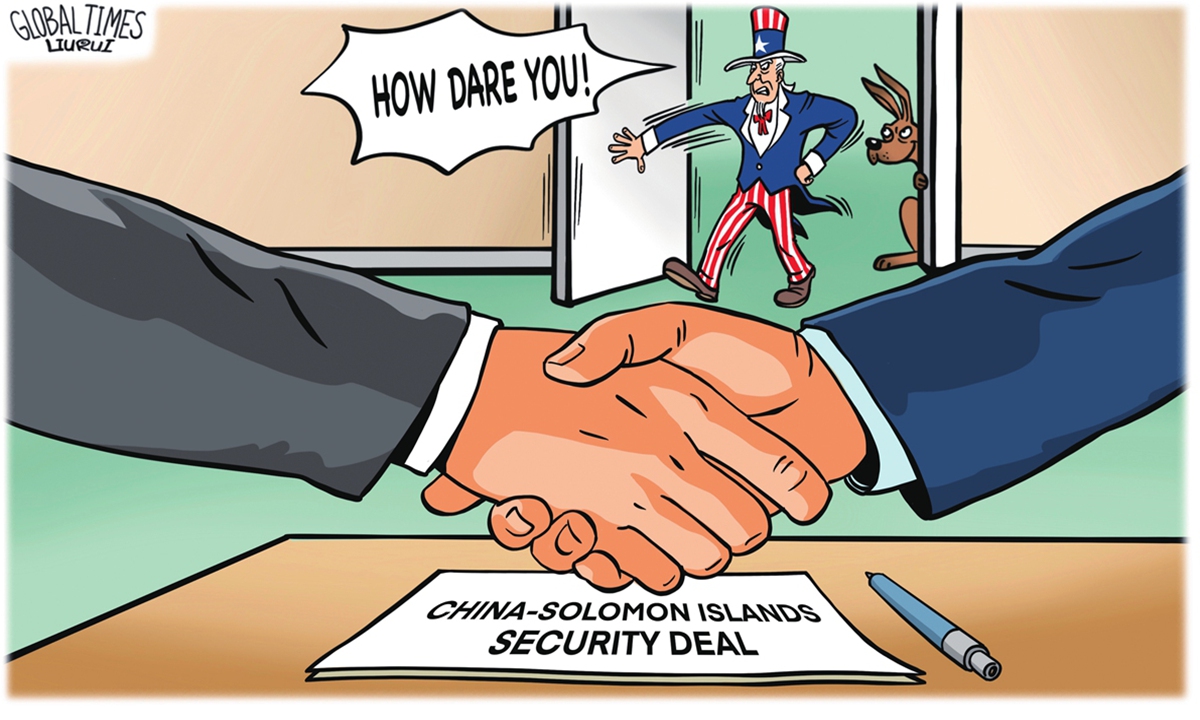
Illustration: Liu Rui/GT
The Financial Times (FT) reported on Saturday that China is intensifying its drive for influence in the Pacific by negotiating security deals with two additional island countries, including Kiribati, following a similar pact with the Solomon Islands, according to officials in the US and its allied countries.
First of all, it is important to understand that the security pact between China and the Solomon Islands and the possible new agreements with Kiribati or other Pacific Island countries are bilateral pacts between sovereign countries, which are signed or promoted at the invitation of the other side. China and these countries have had mutually beneficial ties of friendship and cooperation, as China, trusted by these countries as a friend, is willing to provide assistance within its capacity in many areas which are beneficial to the countries, including in the fields of security and infrastructure. The key reason why these South Pacific Island countries are willing to strengthen cooperation with China lies in China's sincerity, and China does not attach any political conditions when it comes to such cooperation.
The US and Australia have always strongly opposed cooperation between China and South Pacific Island countries. The FT report suggests that the two countries tend to believe that the security negotiations between China and Kiribati will offer China a chance to build "a Chinese air force or navy foothold relatively close to Hawaii," which is claimed to be a threat to the security of the US and Australia. The FT report also mentioned that China is working with Kiribati to upgrade an airstrip on the archipelago's Kanton Island, which is also portrayed as the so-called China's intensifying engagement in the region.
These claims are undoubtedly reckless. There will be no military cooperation between China and the Solomon Islands and Kiribati. To put it more specifically, China will not establish military bases in these islands. In addition, the rehabilitation project for Kanton Island is purely initiated for civilian use only, which has been clarified by the Kiribati government. The project is intended to expand cooperation in Kiribati's foreign tourism projects and to attract more tourists from other countries, which is a project under the China-proposed Belt and Road Initiative, with the long-term advantage of helping these countries build infrastructure through China's various financing methods, solely for the purpose of peace and mutual economic development throughout the region.
China is also doing this out of its own responsibility. As the largest developing country, and in the spirit of South-South cooperation, China is willing to help the South Pacific Island countries to develop themselves, avoid a crisis of survival, and fulfill China's international responsibilities. Be it Kiribati or the Solomon Islands, countries in this region are very sensitive to climate change, and too drastic a change in temperatures will cause a large part of their territories to be submerged in the ocean. China's cooperation with them on disaster prevention and mitigation, as well as security, is also out of desire to help these countries ensure their own survival as well as economic development.
On the contrary, the US and Australia does not care about these factors at all. All they think about is the so-called security issues. And it is precisely because they regard the South Pacific Island countries as their own backyard and continue to conduct missile tests in the region that these countries have become so vulnerable today.
The US never makes an effort at self-reflection. It just keeps accusing China and exaggerating the so-called China threat. It has no right to do so. Its hysteria on China-related security agreements stems out of their own selfishness, ignoring the real national security interests of these island countries.
Meanwhile, the Australian government has taken advantage of the security cooperation framework agreement between China and the Solomon Islands as one of crucial leverages to display its tough stance against China.
Still, there should be no illusions about upcoming prime minister Anthony Albanese on Australia's future China policy, because the US will always be the biggest influence. Australia has been one of the US allies, the Five Eyes alliance, and the Quad. Last year, the UK, US and Australia established AUKUS. Moreover, Australia is also a member of Indo-Pacific Economic Framework (IPEF), a US-led anti-China initiative. Whenever Australia wants to develop its ties with China, it will continue to face disruption from the US.
China may not expect Albanese to completely improve China-Australian ties. But China does hope that he can at least view the bilateral relationship in the spirit of pragmatic diplomacy.
The author is a Chinese military expert and TV commentator. opinion@globaltimes.com.cn




